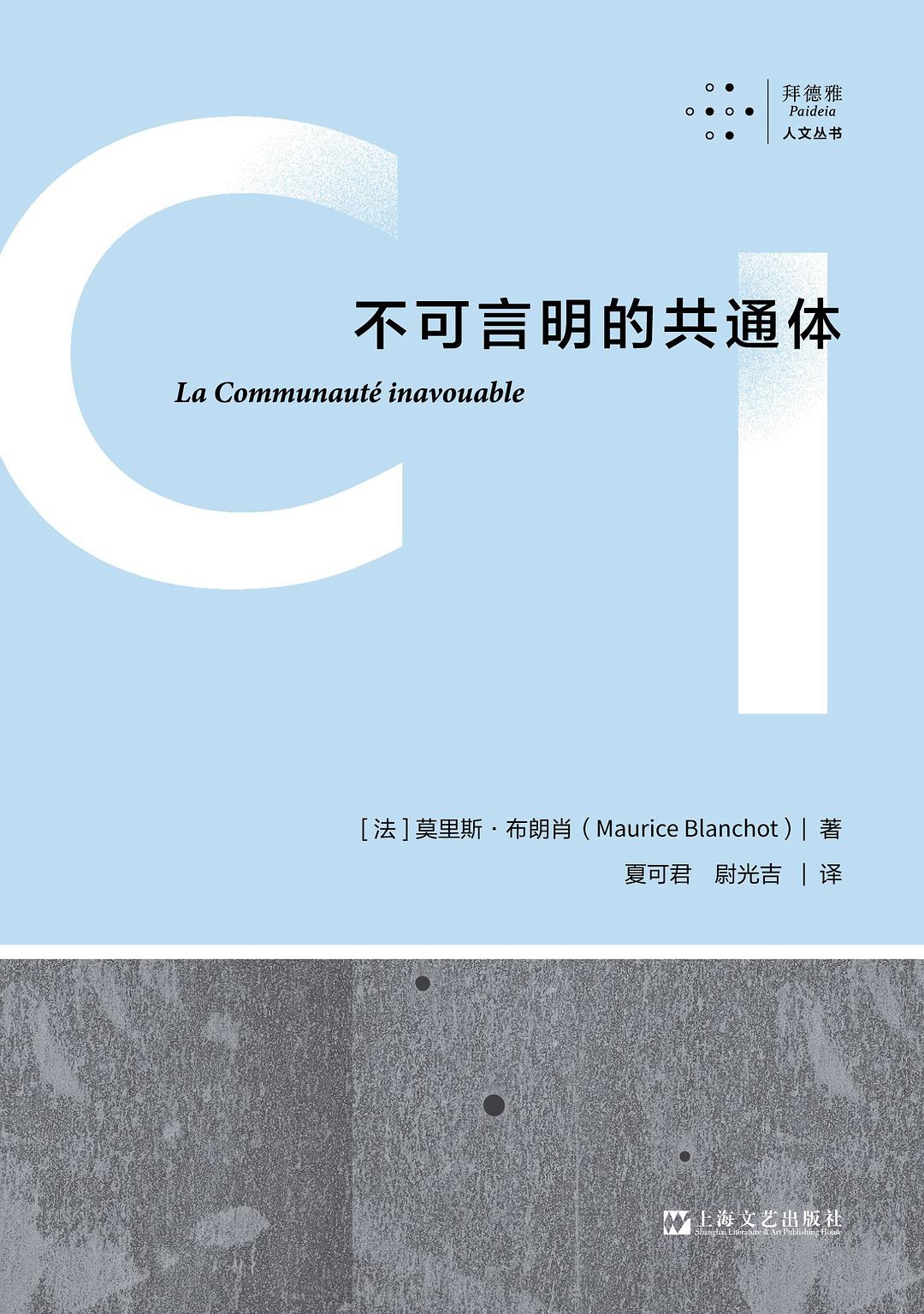1
/
of
1
The inexpressible community
The inexpressible community
[French] Maurice Blanchot Xia Kejun and Wei Guangji 译
Regular price
$11.99 USD
Regular price
$11.99 USD
Sale price
$11.99 USD
Unit price
/
per
Low stock
Couldn't load pickup availability
About Book
About Book
La Communauté inavouable
- Editor's Recommendation -★Seven years later, the out-of-print book comes back with a comprehensive revision of the translation.
Maurice Blanchot is one of the most important contemporary French thinkers, influencing a whole generation of French theorists, including Foucault and Derrida. This book is Blanchot's representative work from his later years.
★In this little book, Blanchot directly faces the idea of "community", which seems simple but is actually complex. He follows the thinking of Nancy, Bataille, Duras and others, and develops the clearest discourse on this in his usual obscure style.
As its title suggests, this book maintains a certain ineffable quality. If we must speak about it, what words should we use? Blanchot believes that "this is one of the questions that this little book entrusts to others. Rather than expecting them to answer it, let them choose to carry it with them and perhaps even expand it."
Its small size contrasts sharply with its vast intellectual capacity. In this great era we live in, this small book is also a truly "big book."
- Introduction -
On the one hand, the urge for community that "The Unspeakable Community" responds to is being forgotten in this world, and even the consequences of this forgetfulness are difficult to perceive. On the other hand, it itself stems from a hidden community, a community of both books and texts, and a community of love. Reading writings about community is first and foremost about confronting its absence. However, in order to at least attempt to approach this community without direction in the darkness, it is necessary to listen to a few vague voices that are reluctant to express themselves.
The book consists of two parts: the first half is "Negative Community," the second half "Community of Lovers." Like much of Blanchot's writing, it ostensibly serves as a commentary on two other authors and their works: Jean-Luc Nancy's philosophical essay "The Ineffective Community" and Marguerite Duras's account, "The Sickness of Death." But the fundamental question, the question of community, as in Nancy's case, first points to Georges Bataille. In this invisible conversation, Bataille first, in a subtle gesture, raised the demand for community. Writing during World War II in his "Summa Atheologica," Bataille again raised the question of "communication" in relation to ecstatic experiences, and in his notes he left behind the explicit definition of community that captivated both Nancy and Blanchot: "Negative Community." Although Nancy's research on Bataille reignited the idea of community, this definition, found within the cracks of Bataille's text, remains mysterious. With the dim light surrounding this definition, Blanchot once again introduces the community into the outer night.
Duras's account is shrouded and surrounded by this darkness, and the lover's community achieved between man and woman is exposed to the time of this night. What Blanchot seeks to demonstrate here is precisely the power of this darkness that permeates the community, for while this power dissolves the relationships between its individual members, it also makes them a true community in Bataille's sense: the loss of community is also the formation of community. To understand this seemingly paradoxical assertion, to enter into this profoundly alien relationship within the community, it is necessary to recall Levinas's perspective and restore the fundamental asymmetry between self and other. Only the death of the other can allow the "I" to open up to the community; only by moving toward the absolutely other outside, surrendering myself to the infinite darkness, can the "I"'s finite loneliness no longer be borne alone.
Community always inscribes secret friendships. Bataille's "Friendship," the subtitle he himself initially gave to his book The Guilty, commemorates his friendships with those whose names remain unrecorded; Blanchot's "Friendship," the title he chose for his 1971 collection of essays, pays homage to his friends, including Bataille (and it was the essay commemorating Bataille that dictated the title). And this short book, through its critical work, once again summons Blanchot's multiple friendships with Bataille, Duras, Levinas, and Nancy. Isn't the community of lovers (amants) also the community of friends (amis)? For community is the witness of love (amour), even though this love also drifts in the smiles of the dead and the tears of the living, touching the impenetrable boundary of eternal night between the absent silent and the present speaker.
Publication Date
Publication Date
2023-07-01
Publisher
Publisher
上海文艺出版社
Imprint
Imprint
Baideya
Pages
Pages
112
ISBN
ISBN
9787532187898
share

